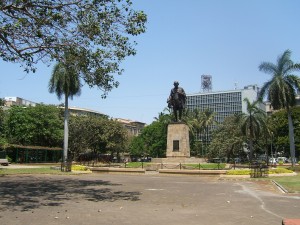I’m in Mumbai where the taxi drivers are not unnaturally obsessed with the imminent World Cup match between India and Pakistan. But however open to it as a sporting occasion, the cricket hasn’t mellowed their feelings on booting as many Muslims as possible out of India.
I have two drivers in a row who, unprompted, volunteer their ‘all Muslims are terrorists’ thoughts – although perhaps the continuing high security around the Taj Malabar hotel serves as some sort of prompt, a visible reminder of what is referred to here simply as 26/11.

I want to show my 11-year-old son Gandhi’s house. The elderly taxi driver is not impressed. ‘Gandhiji! he snorts. ‘Div-id-ed the country.’ (He stresses “divided” so hard the word almost falls in half). “I don’t like him at all. My family had land in Northern Bengal (now Bangladesh). We lost it at Partition. So now I am a taxi driver.’ And appreciation of Gandhi in India is often less fervent than the casual Western visitor might presuppose. I have heard similar views expressed from Kochin to the Himalaya. His ideals of ecumenical pacifism, vegetarianism, let alone his much debated celibacy, are not shared by many.
There is a revealing exchange of correspondence in the Gandhi Museum with the man from whom many of his ideals came from, Tolstoy. Gandhi is in some ways the disciple, who had collaborated at the Tolstoy farm in South Africa – yet in the letter he comes over bossily, as the one demanding attention, while the gentle Tolstoy, who by this stage, 1910, was very frail, goes out of his way to placate Gandhi by saying that he has read a biography of him.
In some ways, how much more quietly impressive does the current Prime Minister of India, Manmohan Singh, seem, the architect of India’s financial recovery in the 1990s and now a sane advocate of dialogue with Pakistan – over a game of cricket, if that helps.
